Domestic violence: One month's death toll
- Published
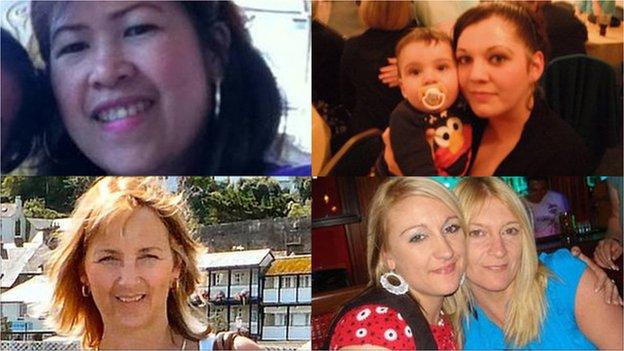
Some of the victims killed by their partners in the month of September 2011
David Gikawa, who murdered ex-girlfriend Linah Keza at her flat in London last year, has become the latest person convicted of a domestic violence-related killing. How common are such crimes?
On average about seven women and two men, external are killed by their current or former partner every month in England and Wales.
Campaigners have called this death rate a "scandal" and say victims' appeals for help are too often met with apathy, disbelief and even hostility by police.
As a snapshot, chosen because in most cases the judicial process has run its course, below are the stories of eight people killed during just one month - September 2011.

Michala Gol and Julie Sahin, 4 September
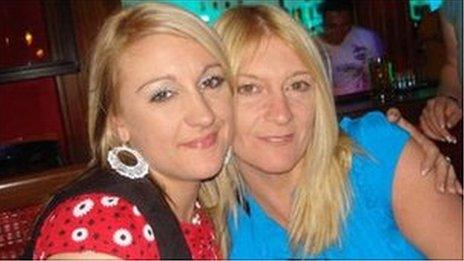
Michala Gol (left) and her mother Julie Sahin were murdered by Ensar Gol
Julie Sahin and her daughter Michala Gol were killed by Mrs Gol's husband on 4 September.
Ensar Gol repeatedly stabbed his 28-year-old wife at their home in Thame, Oxfordshire.
Oxford Crown Court heard the couple's three-year-old daughter was in the bedroom where Mrs Gol was killed, while their son, two, was asleep in another bedroom.
When Mrs Sahin, 50, and family friend Casey Wilson, 20, ran upstairs to defend her, he stabbed both of them, killing Mrs Sahin.
Gol was jailed for life and told he must serve a minimum of 36 years for the murders.
The court heard he had sent a Facebook message before the killings, writing "wild Turkish wolf ready to slit their throats".
During the trial, prosecutor Dafydd Enoch said Gol was unhappy and homesick - but said nothing could explain the "cold acts of murder in which he indulged".
In a statement, the family described Mrs Sahin as a "wonderful and special" person who "doted on her grandchildren" and Michala as a "beautiful young mother who only ever wanted the best for her young children".

Melissa, Noah and Mark Crook, 10 September
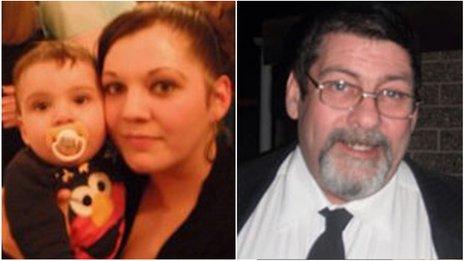
Melissa Crook, her son Noah and her father Mark were all murdered by her ex
Melissa Crook died in a house fire in Chatham, Kent, along with her 15-month-old son, Noah, and her father, Mark.
The fire was started by Miss Crook's ex-partner Danai Muhammadi, who a court heard was filled with "spite, anger and resentment" over their break-up.
Muhammadi, from Coventry, was jailed for life and must serve a minimum of 38 years for the killings.
His friend Farhad Mahmud, 35, from Maidstone, was also jailed for life, with a minimum of 34 years behind bars.
Muhammadi's girlfriend Emma Smith, 22, from Coventry, was convicted of manslaughter and sentenced to 14 years in prison.
Fire investigators said Miss Crook, 20, had been trying to rescue her son when she died. Her family said she had "a beautiful heart".
Miss Crook's mother Amanda Crook, who escaped the fire, told the BBC there was nothing the police, social services or anyone else could do to prevent such killings.
"I don't think you'll ever stop that," she said.
"There was no warning signs, there was no signals, there was no nothing."

Sashana Roberts, 12 September
Sashana Roberts was stabbed and strangled in her bathroom by ex-boyfriend Ezekiel Foster.
Ms Roberts, 24, who had three children, had tried to end the relationship two weeks previously, which police said prompted the attack.
Foster, of Brent, north-west London, was described by the victim's mother as "very possessive and controlling".
He was convicted of murder and jailed for life, with a minimum term of 19 years.
Ms Roberts's two youngest children, aged one and three at the time, were in the house in Cricklewood, north London, when their mother was murdered.
In a statement, Ms Roberts's mother Lorna said: "I hope that her little girl was too young to remember anything but I know that her little boy has seen things."
The Metropolitan Police confirmed it received "a number of calls" from Ms Roberts in 2008 and 2009 about Foster.
A spokeswoman said Foster was arrested after each allegation and the "best evidence available" was given to the Crown Prosecution Service, and Foster was charged with common assault in 2009.
"Despite the charge, Ms Roberts did not feel able to assist with the investigation and, ultimately, no evidence was offered when the case reached court," the spokeswoman said.
The Met said it had made "significant changes" to the way it investigates domestic abuse after "tragic and complex cases" such as that of Ms Roberts.

Jennie Leeman, 18 September
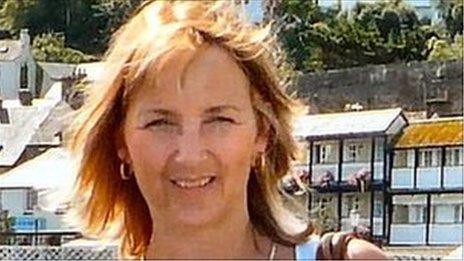
Jennie Leeman died on the farm where she had lived for 10 years
Jennie Leeman, 44, was shot five times at close range by her estranged husband David.
After discovering his wife had begun a relationship with another man, 60-year-old Leeman killed her with a semi-automatic pistol he had kept illegally hidden at their farm in Parracombe, Devon.
A jury at Exeter Crown Court cleared him of murder after he admitted manslaughter on the grounds of loss of control.
Sentencing him to 12 years in prison, Mr Justice Butterfield said Mrs Leeman's death was a "terrible tragedy" and a "precious life needlessly lost".
The court heard Leeman had become obsessed with his belief that his former wife's new partner was a paedophile - though police found no evidence to support this.
The judge said he did not accept that medication Leeman was taking had any effect on his behaviour. He said Mrs Leeman had presented no threat and the defendant acted out of "anger and frustration".

Charito Cruz, 26 September

Charito Cruz was bludgeoned to death with a claw hammer
Charito Cruz was hit 50 times with a hammer after she ended her relationship with Muhammed Asad Niazi.
Niazi, from Kingston, south-west London, was jailed for life and ordered to serve a minimum of 12 years for the murder, which he carried out in front of their young daughter.
Social work managers had ignored requests to visit Ms Cruz, 37, shortly before her death, leaked council documents suggested.
The NSPCC twice referred her to social services at Kingston Council because of Niazi's abuse.
An internal review by the council found that on one occasion a social work manager did not think the case was serious enough to require a home visit.
On the second occasion, the manager did not read the referrals but took the documents home to read. Ms Cruz was killed that night.
The council later said new senior managers had been appointed and a "significant investment" had been made.
A domestic homicide review into the case is currently in progress.

Expert views:
Since April 2011 the law has required a domestic homicide review to be carried out after every domestic violence death in England and Wales.
Davina James-Hanman, director of the charity Against Violence and Abuse and independent chair of several such reviews, including that into the death of Charito Cruz, said they analyse the way agencies such as the police and social services handle cases. Progress made to prevent future violence is also examined.
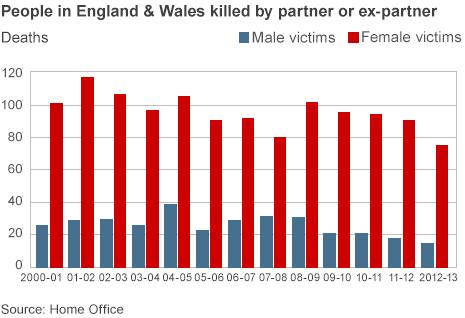
She said the benefits of the reviews could include identifying "new risk factors".
.jpg)
Davina James-Hanman says some women cannot access help
One factor not widely recognised at present was the length of time someone had pursued their ex-partner, she said, citing the example of a man who harassed his ex for six years before killing her.
Ms James-Hanman said public services had made progress but that co-ordination between them was still "missing".
She said the system "starts to fall apart" when someone experiencing domestic violence also has other problems such as mental health or drug abuse issues.
And she said there was a "sub-culture" of women who could not or would not access help, such as those with "immigration issues" and women who are "followed everywhere" by their partners.
Ms James-Hanman said the term "domestic homicide" should also include suicides prompted by domestic violence, but at present such deaths were rarely treated in this way.
Although men are less likely to be killed by a current or former partner, further work is needed to make sure those at risk are identified and helped, said Mark Brooks - chairman of the charity the ManKind Initiative.
"We as a society need to do more to recognise and accept that men are victims too, so we look for signs of domestic abuse in the same way as we would for a female victim."
There is no "typical" case, but male victims often suffer emotional and psychological abuse and can feel as though they have been groomed and isolated from friends and family, said Mr Brooks. There may also be physical abuse.
Male victims need to "feel they will be believed", with more awareness campaigns and "escape routes" including refuges and safe houses available, he said.
- Published21 May 2014

- Published24 January 2013

- Published13 July 2012

- Published2 July 2012
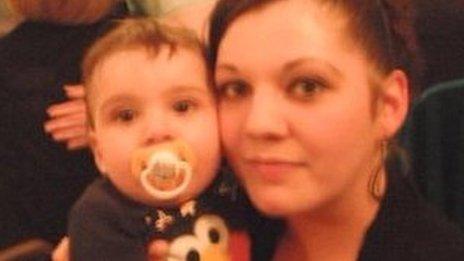
- Published31 May 2012

- Published4 May 2012
